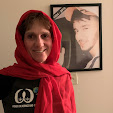



Dear Friends,
Yesterday the village of Azzun Atma had its first demonstration. In my previous post I explain the situation of this village which is being strangulated by the wall and the surrounding settlements. The demo was organized by the Palestinian People’s Party (PPP) with banners, tee shirts, flags and good chants. (Well, I think they sounded good but I don’t really know what they meant.) Maybe because it was the first demonstration for this particular village, the soldiers were pretty laid back. No tear gas, no bullets (rubber or otherwise), no sound bombs. The PPP hopes to continue these nonviolent demonstrations in Azzun Atma and also spread them to other villages in the area.
After the demonstration I got a ride to Tel Aviv with some of the Israeli activists that participated. I wanted to spend some time with my Israeli friend, Rivka. Rivka had been living in Berkeley for the last 3 years and just recently moved back to Israel. She invited me to a commemoration/celebration of her brother who died 3 years ago in the 2006 Israeli war on Lebanon. She appreciated that I had accepted the invitation because one of her very good friends from childhood who is a member of Anarchists Against the Wall (one of the Israeli peace groups that I highly regard) refused to come to a commemoration for a soldier. Rivka could not understand it. I think that she is like most Israelis who do not know their own history, or their current realities. For instance, during our walk on the beach we came across a small museum honoring the Irgun as freedom fighters and liberators. Virtually all credible historians acknowledge that the Irgun were one of the illegal terrorist groups that were instrumental in the atrocities that paved the path for the creation of the state of Israel. This fact surprised Rivka. She was also surprised to learn that that Modi'in, the settlement that has taken much of the land of Bil'in is a settlement. She thought it was just another city/town in Israel. She also didn't realize that 80% of West Bank water is confiscated for Israel and the settlements. (The Israeli water company will sell it back to Palestinians at an inflated price.)
After the commemoration I was stressing about how I was to return to Hares. Since it was Saturday there were no buses running. Rivka spent a lot of time on the Internet and calling taxi companies to no avail. Finally, we looked at a map and realized that it would not be very far for her to drive me. So she did despite the fact that the idea of being in the West Bank terrifies her. She imagines that the West Bank is be filled with people who want to kill her. I told her that if she comes with good will and no gun, there is no problem. I am happy to report that she returned home safely.
Love,
Wendy











